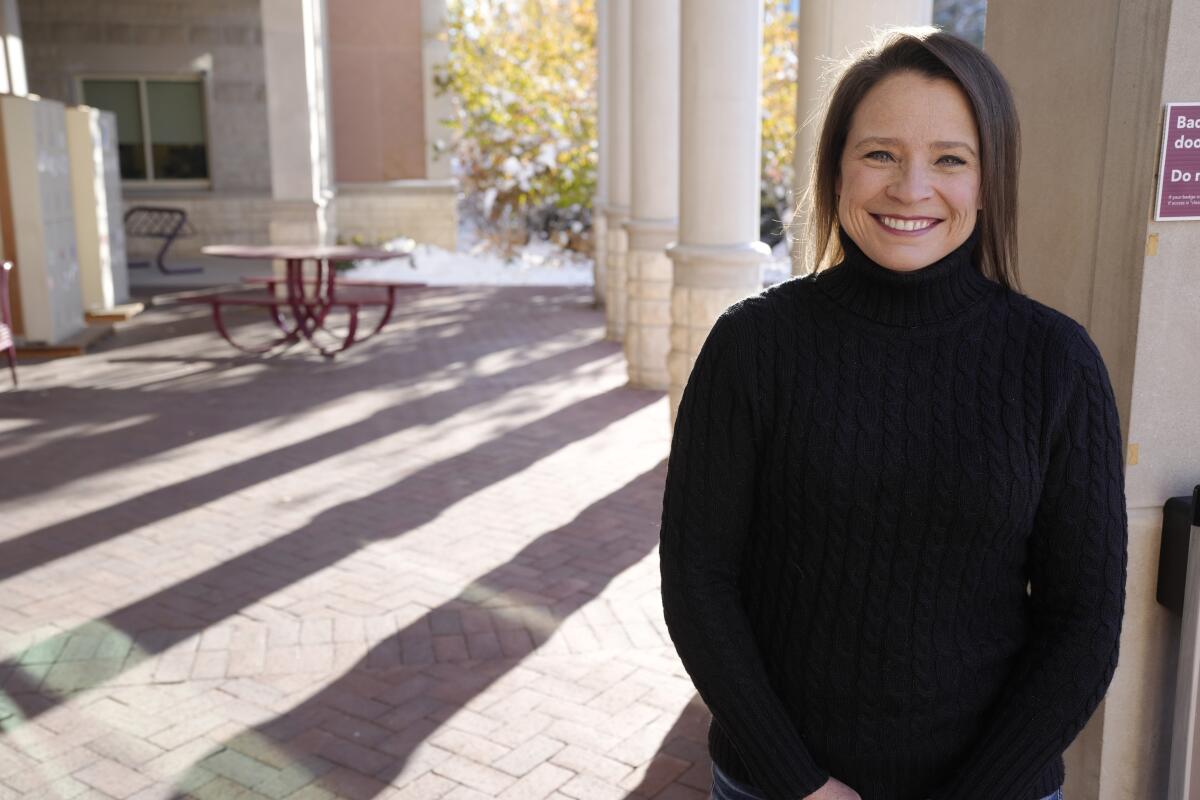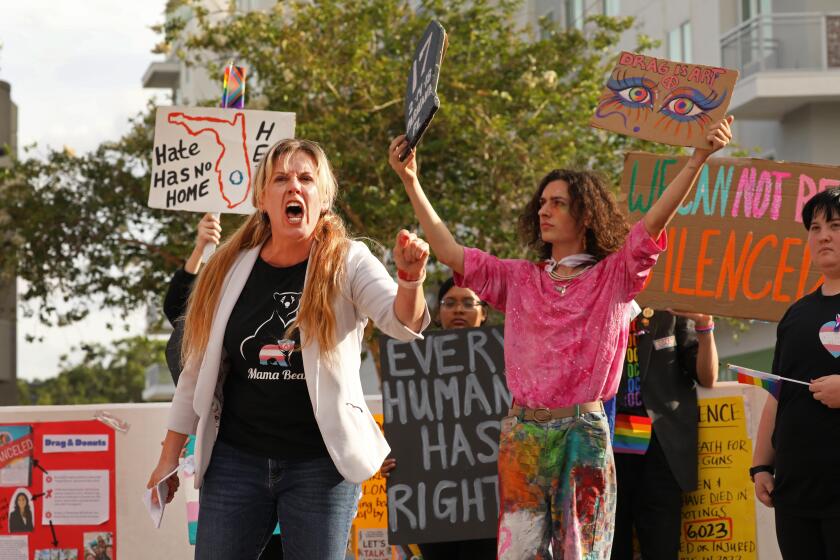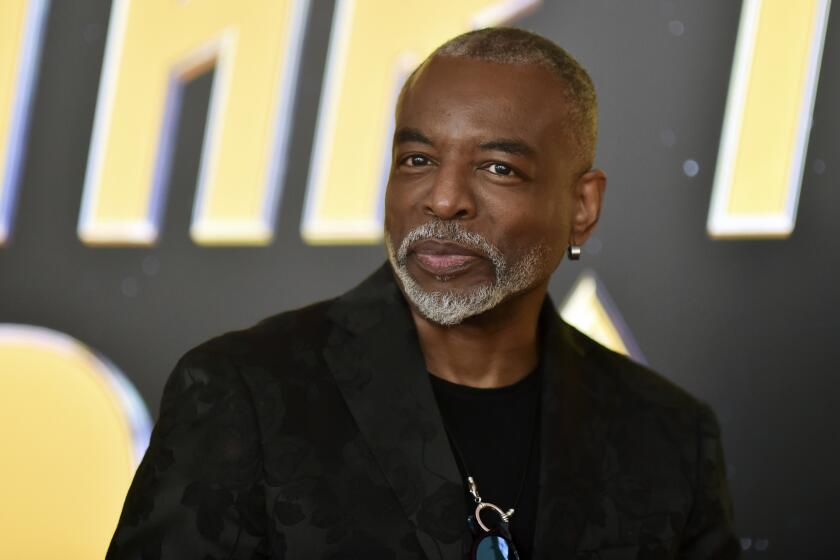Fired librarians who opposed book bans turn to civil rights agency for redress

- Share via
CHEYENNE, Wyo. — She refused to ban books, many of them about racism and the experiences of LGBTQ+ people. And for that, Suzette Baker was fired as a library director in a rural county in central Texas.
“I’m kind of persona non grata around here,” said Baker, who had headed the Kingsland, Texas, library system until she refused to take down a prominent display of several books people had sought to ban over the years.
Now, Baker is fighting back. She and two other librarians who were similarly fired have filed workplace discrimination claims with the U.S. Equal Employment Opportunity Commission. And as culture war battles to keep certain books from children and teens put public and school libraries increasingly under pressure, their goal is redemption and, where possible, eventual reinstatement.
So far, it’s a wait-and-see whether the claims will succeed — and set new precedent — in the struggle between teachers and librarians around the country who oppose book bans and conservative activists who say some books are inappropriate for young minds.
Conservatives vilify school librarians as “groomers and pedophiles” for stocking LGBTQ and racially themed books. “We have been cursed,” said one librarian.
The fight has involved a record number of book-banning efforts, some libraries cutting ties with the American Library Assn. — which opposes book bans — and even attempts to prosecute librarians for allowing children to access books some consider too graphic.
At least one terminated librarian has gained a measure of success.
Brooky Parks, who was fired for defending programs on anti-racism and LGBTQ+ stories she organized for teens at the Erie Community Library north of Denver, won a $250,000 settlement in September. Reached through the Colorado Civil Rights Division, the settlement requires her former employer to give librarians more say in decisions involving library programs.
Parks’ settlement with the High Plains Library District capped a stressful eight-month period without work, when community donations helped her avoid losing her home. And it will probably resolve Parks’ claim with the EEOC, said attorney Iris Halpern, who represents Parks and the other two librarians.
“I just wasn’t going to back down from it. It was just the right thing to do,” said Parks, now a librarian at the University of Denver.
Actor, author and ‘Reading Rainbow’ founder Levar Burton joins the L.A. Times Book Club to discuss the State of Banned Books.
After her firing in 2022, Baker filed an EEOC claim against her employer, the Llano County Library System in Kingsland. And in September 2023, Terri Lesley filed a claim over her firing last summer as executive director of the Campbell County Public Library System in Gillette, Wyo.
Halpern, with the Denver firm Rathod Mohamedbhai, compared the wrongful-termination claims to civil rights-era legal battles.
“It is honestly sad that we’ve gotten to this point. But history is a constant struggle, and we have to learn from our past,” she said.
The 1964 Civil Rights Act established the EEOC to enforce laws against workplace discrimination. One legal expert thinks the librarians might be able to prevail on the grounds that, under those laws, employees may not be discriminated against for associating with certain classes of people.
“With any case, the devil can be in the details in terms of how the facts come out and what they can present. But these are definitely actionable claims,” said Rutgers University law professor David Lopez, a former EEOC general counsel.
In DeSantis they trust: Conservative parental groups and powerful politicians clash with parents, teachers and librarians who oppose the banning of books.
An EEOC investigation can take more than a year. After that, the EEOC may attempt to reach a settlement with the employer out of court, sue on the employee’s behalf or issue a letter saying the employee has grounds to sue on their own.
The librarians haven’t yet received an EEOC response and none is expected before the end of next year.
“I would love to be optimistic,” Baker said. “I know there are a lot of people in this community who are just absolutely behind the library being open and free and equal for all. And there’s a lot of people who aren’t. So it’s a hard, hard situation.”
EEOC spokesperson Victor Chen declined to comment on specific filings, saying, “We can’t even confirm or deny we have these complaints.”
The county attorney offices and other representatives of the government officials who fired Parks, Baker and Lesley did not return phone and email messages seeking comment, or declined to comment.
At her Texas library, Baker displayed several books that have been targeted in recent book bans and a sign that read: “We put the ‘lit’ in literature” — a reference to a Tennessee pastor’s recent burning of books.
Book bans in school libraries, spurred on by legislation pushed by conservatives, rose nearly 30% last semester, according to PEN America.
Baker was fired after refusing to take down the display and signs — considered the last straw after she resisted book banning in her library.
In March, a federal judge ordered 17 books returned to Kingsland library shelves while a citizen lawsuit against book banning proceeded. The works ranged from children’s books to award-winning nonfiction, including “They Called Themselves the K.K.K: The Birth of an American Terrorist Group,” by Susan Campbell Bartoletti; and “It’s Perfectly Normal: Changing Bodies, Growing Up, Sex, and Sexual Health,” by Robie Harris.
“Content-based restrictions on speech are presumptively unconstitutional and subject to strict scrutiny,” Texas U.S. District Judge Robert Pitman wrote in his March 30 ruling. He cited a 2015 U.S. Supreme Court ruling that barred communities from banning signs because of what they say.
The Llano County Commissioners Court decided against closing the county’s three libraries in response to the ruling. Closing the libraries would have echoed the history across the U.S. of closing swimming pools rather than desegregating them, Halpern said.
Like Baker, Lesley had trouble finding work after being fired from the library system she directed in Gillette, Wyo. Her dismissal followed two years of turmoil over challenges to the books available and library programs.
Actor and author LeVar Burton joins the L.A. Times Book Club May 24 to discuss the State of Banned Books.
Some of the same county officials who opposed a transgender magician’s plans to perform at the library went on to join local residents in seeking to ban books, according to Lesley’s EEOC filing.
Baker and Lesley both were fired after local officials appointed new library board members willing to be more aggressive about pulling books.
“Our county commissioners appointed board members who were sympathetic to the people who wanted to remove the books. And it was a long dance to try to get it there. And in the end they had to fire me, I think, in order to be able to meet their goal,” Lesley said.
The Campbell County Commission skirted a deputy county attorney’s recommendation not to appoint past applicants for the board without reinterviewing them along with new candidates, according to Lesley’s EEOC claim.
“I saw this as a well-executed attack on the library by a group of citizens and elected officials. It was an attack on the LGBTQ+ community as well,” she said. “And it was an attack on the books.”
More to Read
Get the L.A. Times Politics newsletter
Deeply reported insights into legislation, politics and policy from Sacramento, Washington and beyond. In your inbox twice per week.
You may occasionally receive promotional content from the Los Angeles Times.














